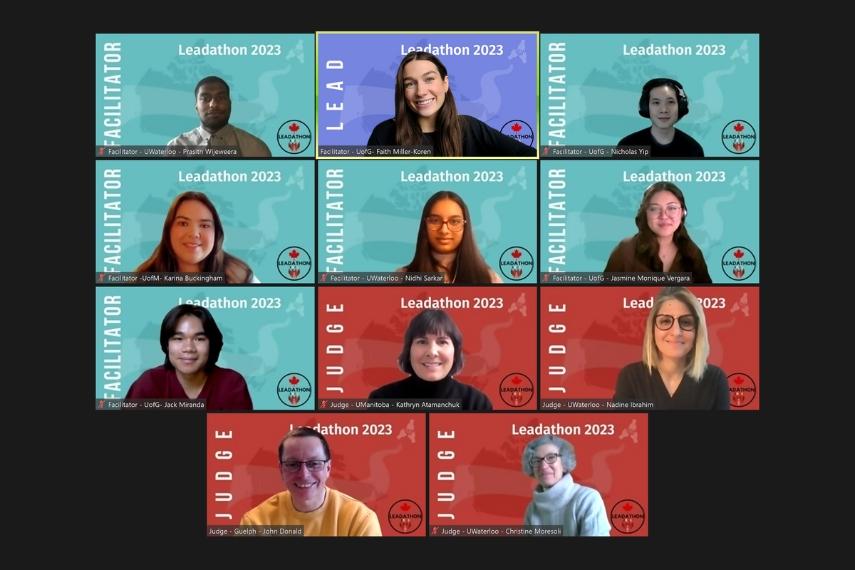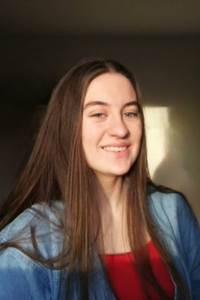Leadathon 2023 brings together the Indigenous Ways of Knowing and the Canadian Engineering Grand Challenges

This year the University of Guelph, University of Manitoba and the University of Waterloo hosted the second engineering Leadathon as part of a project supported by the D2L Innovation Guild.
The Leadathon is a national competition held online, aimed at fostering a “leadership mindset” within the framework of the Canadian Engineering Grand Challenges (CEGC). The Leadathon theme was Weaving Indigenous Ways of Knowing into the Canadian Engineering Grand Challenges, to raise awareness and build capacity around Indigenous Knowledge for engineering students.
Participants tackled complex socio-technical case-studies relevant to Canada’s Indigenous communities and gained insight into how Western and Indigenous worldviews can be synthesized to address emerging societal issues. Elder William (Bill) Woodworth, PhD, the Elder in Residence at the University of Waterloo Faculty of Engineering opened the Leadathon with a traditional land acknowledgement and thanksgiving address.
Leading the Leadathon was a team of 4 faculty members: John Donald (University of Guelph), Kathryn Atamanchuk, (University of Manitoba), Christine Moresoli (University of Waterloo) and Nadine Ibrahim (University of Waterloo); and 11 student facilitators. On event day, 8 judges from multiple Canadian institutions supported the event.
Participating student teams were prompted to weave Indigenous Ways of Knowing into the Canadian Engineering Grand Challenges in a facilitated workshop format using visualizations and case studies. The specific Indigenous Ways of Knowing concepts that were presented were:
- Land-based Learning
- Seven Generations Principle
- Traditional Ecological Knowledge
- Sharing Circles
- Inspiration from Nature
- Two-eyed Seeing
Teams had an hour and a half to create, finalize and submit their visualizations. They focused on defining a relevant problem space and developing a framework to both address their selected CEGC while framing it around one of the concepts of the Indigenous Ways of Knowing of their choice in their submission. All teams prepared creative submissions, impressing the judges with their inspiration and innovation.

Megan Davidson, an engineering student at U of G felt, “As an Indigenous person and an engineering student I was very excited to find out this year’s theme. This has been the first big opportunity to bring together my life experiences and knowledge as an Indigenous as well as what I have learned through my engineering degree. Although I was familiar with Indigenous ways of knowing prior to this workshop I had never tried to apply them to large scale challenges.”
Overall, this second annual Leadathon was a great success, with students noting that in working with their teams, they gained leadership and teamwork skills and developed a better understanding how Indigenous Ways of Knowing can apply to modern challenges. A total of 29 students participated from 4 Canadian universities (University of Guelph, University of Manitoba, University of Waterloo, and York University), making up 9 teams with three teams receiving prizes for best capturing how to Weave Indigenous Ways of Knowing into the Canadian Engineering Grand Challenges.
“The case studies presented were new to me and it was really interesting to learn what specific communities were doing, it was really thought provoking, especially working in a team choosing which 2 indigenous ways of knowing best fit the case study. We struggled to choose because they could all apply, my team also kept wanting to delve deeper as engineers wondering how we could help improve the lives and sustainability of people in these communities...At the end of the day I felt really inspired to continue to bring in my Indigenous knowledge to engineering projects in the future,” shared Megan.
The three winning teams were:
Team 2 – Access to affordable, reliable and sustainable energy
Megan Davidson (Guelph), Manjyot Kalkat (Manitoba), Yiming Luo (York)
Team 4 – Inclusive, safe and sustainable cities
Zeena Abdelbasit (Guelph), Ilyas Abdullahi (York), Mercy Onwuteaka (Manitoba)
Team 5 – Inclusive and sustainable industrialization
Sage van Kooten(Guelph), Syed Mustafa Jamal (York), Daniel Wilson (Manitoba)
The six Canadian Engineering Grand Challenges (CEGC) identified by Engineering Deans Canada are:
- Resilient infrastructure
- Access to affordable, reliable and sustainable energy
- Access to safe water in all communities
- Inclusive, safe, and sustainable cities
- Inclusive and sustainable industrialization
- Access to affordable and inclusive STEM education